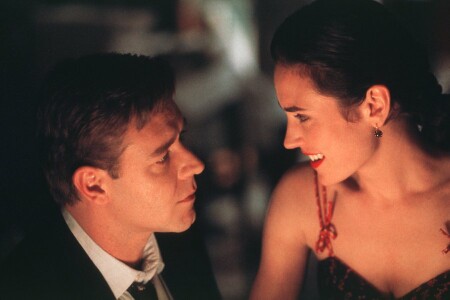Starring Russell Crowe, Jennifer Connelly, Ed Harris, Paul Bettany, Adam Goldberg,
Judd Hirsch, Josh Lucas, Anthony Rapp, Christopher Plummer, Vivien Cardone.
Directed by Ron Howard.
It is 1947 and John Forbes Nash Jr. (Crowe) has arrived at Princeton for graduate study
in mathematics. He has no prep school legacy or old money ties, just Princeton's most
prestigious fellowship. It's not an easy fit for Nash or for Princeton. Social niceties
mean nothing to him, neither does attending class. He is obsessed with just one thing
- finding a truly original idea. That, he's convinced, is the only way he will ever
matter. Princeton's math students are competitive and some would love to see Nash
fail. Still, they inadvertently inspire him. He's with them one night in a local
bar when their reaction to a hot blonde grabs his attention. As Nash observes their
rivalry, the idea that has been haunting him bursts into focus. His resulting paper
on game theory - the mathematics of competition - boldly contradicts the doctrines
of Adam Smith, the father of modern economics. Nash's life is changed forever.
Nash begins teaching at MIT, but is not satisfied. As the Cold War rages, Nash is
recruited by the shadowy William Parcher (Harris) for a top-secret assignment as an
enemy code-breaker. Nash throws himself into this consuming effort while continuing
his work at MIT. It is there that he is challenged in an altogether new way by the
beautiful and brilliant Alicia Larde (Jennifer Connelly), a physics student who introduces
Nash to a concept he was not familiar with - love. Nash and Alicia marry, but he keeps
his work secret from her. The work, the secrecy and the danger take their toll. Nash is
furtive, obsessed and finally plunges into a world of delusions - paranoid schizophrenia.
He is helped by Dr. Rosen (Plummer), but as the delusions continue, Nash works to
slowly rebuild his life without medication. Alicia struggles under the strain of
loving a broken genius, but Alicia can still glimpse the charismatic man she fell
in love with and that fuels her commitment to help him fight his way back. Through
sheer force of will he comes back to Princeton, continues his work, and in 1994 receives
the Nobel Prize.
The story is based on the continuing life of John Nash, whose insightful work in game
theory has become one of the most influential economic ideas of the twentieth century.
A Beautiful Mind is the very-well performed, inspirational film of his life
leading up to teh Nobel Prize. It is the kind of film that the Academy Awards love to
honour, so expect to hear its name come nomination time. The good news is that it
is a good film, notwithstanding the usual tear-jerking and manipulations that accompany
overcoming-all-obstacles comeback stories. There is enough humour and energy,
provided primarily by Bettany's Charles Herman, Nash's best friend, to keep things
moving and to nicely balance the more intense and depressing segments. The dialogue
varies from poignant and heartfelt to just the kind of weighty speeches that only
happen in the movies, although several of those scenes work well because of the
quality of the performances.
There has been sanitation of the story from Sylvia
Nasar's book, with Nash's toying with homosexuality and other quirks nowhere to be
found in the movie. You have to admire Alicia for hanging in her marriage after it
became not at all what she bargained for, and her frustration and loyalty is illustrated
well in the film. You never know how much of the action is true to Nash's life,
and how much has been juiced up to make things more dramatic, but it is also hard to
believe that Nash dreamed up all the cloak and dagger stuff that he is supposed to
have imagined. But then I've never been schizophrenic.
The two people most responsible for keeping the sap level down and the believability
up are Russell Crowe and Jennifer Connelly. There are many times where either could
have gone with over-the-top histrionics like some actors do shilling for an Oscar,
but they resist. Crowe shows excellent range, transforming his athletic body into
a believably geeky, socially-awkward scholar. But the most amazing performance is
turned in by Connelly. Known mostly for "babe" parts and often wooden acting in the
past, she gives a sensitive, internal performance that is consistently excellent throughout.
When various critic groups named her the best supporting actress of the year, I figured
they had to be joking. They weren't.
A Beautiful Mind is worth seeing for the two outstanding performances,
and the chance to catch a glimpse into the mind of a person with schizophrenia.
   
If you would like to respond, please click the
E-Mail

Press Here To Go To The Review List Page
|











